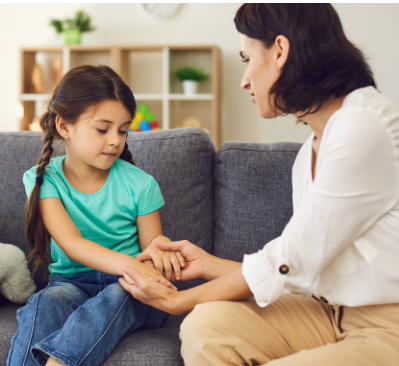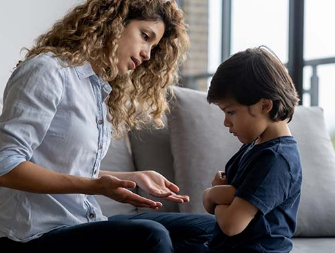
Helping children with their emotions
By: Sandy Hartley, Teacher-Tutor-Wellbeing Practitioner
As parents or carers of young children, helping them with their emotions is a big part of what we do! It can also be the most challenging part, often because it triggers our own feelings. But if we can think beforehand how best to help them, being prepared can make it easier to deal with.
From early on in their lives, babies and children express their emotions without restraint - through non-verbal communication such as crying, shouting, or laughing, and through their behaviour. As an adult it is important to recognise that these are simply a way of the child conveying their distress (or joy!) in the moment; it is never a deliberate act to annoy or control you.
A child's behaviour is never a reflection on you as their parent or carer; you can only be responsible for how you respond to it, which is crucial to them developing an understanding of their feelings, and how to manage them; both now and later on as adults.
There are several important messages we can give them in how we respond, that will promote a healthy expression of feelings, emotional wellbeing, and your relationship with them. After all, knowing someone understands and is empathetic to your feelings, is key to developing a nurturing, trusting bond.

1. Emotions are normal
We can all feel overwhelmed by our emotions at times, and this is especially true for babies and young children. But it is important to recognise that having feelings is a normal and natural part of life. How you respond to your child's distress, teaches them how to respond to their own emotions. If you can remain calm, this will reassure the child that their feelings are manageable.
2.
No emotions are 'bad'- even if they feel 'bad'
Children often learn that emotions such as anger, sadness, or frustration are
bad, because of how adults react to these emotions. These feelings also feel
uncomfortable in the body, and children can easily feel overwhelmed by the
physical sensations. But all these feelings are valid and giving children a
sense of acceptance of their emotions helps take the intensity out of these
feelings, allowing them to pass more quickly. Show children that you accept
their feelings, by using a calm voice to verbalise their feelings for them, for
example 'I can see that you are feeling cross about having to tidy up. It's ok
to feel that way when you want to keep playing and have to stop'
3.
Emotional support
Children learn how to support themselves, through the ways that we support
them. Isolating children who are feeling emotionally overwhelmed, creates a
sense of abandonment, low self-esteem, and teaches children to suppress their
feelings which can harm mental health. By keeping calm, showing acceptance of their
emotions, and then creating space for them to safely express their feelings
with support, through drawing, talking, or doing something physical, promotes
emotional well-being, self-esteem, and resilience.


Submit your comment